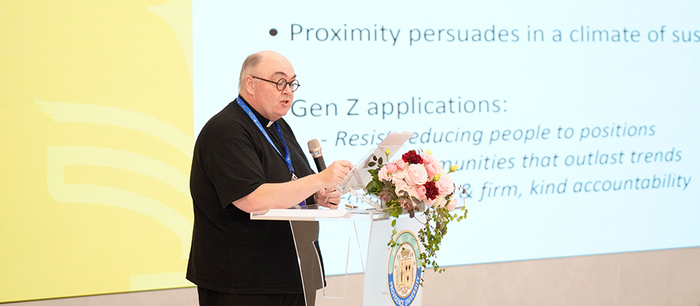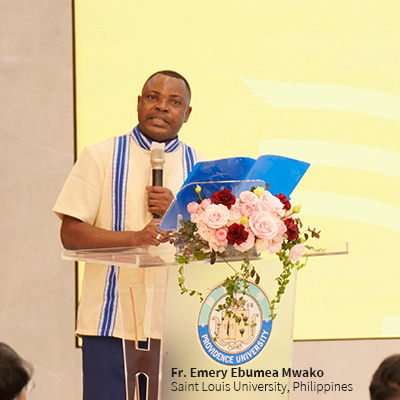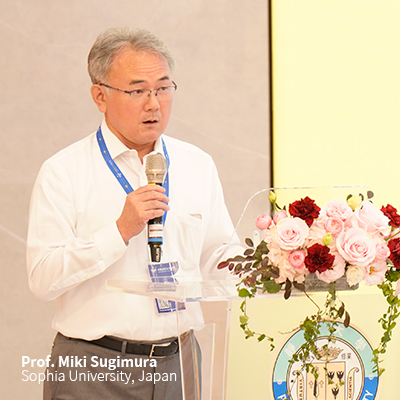


講者:Prof. Stephen Morgan (University of Saint Joseph, Macao / 澳門聖若瑟大學)
我們正處於一個許多事物顯得脆弱的時代。戰爭持續、氣候哀鳴、對制度的信任薄弱。科技發展的速度超越反思,而即使身處人群,我們依然感到孤獨。許多人不僅將這份感受放在心裡,更刻進了身體與心靈——焦慮、倦怠,以及對未來的無聲疑問。
然而,在挑戰中同時存在著真切的希望。當火災發生時,Z世代發起行動提供人們食物與收容處所;當政策無法解決問題時,年輕專業人士挺身而出,建構所需的資源與系統;當凌晨 2:03 收到朋友的求助訊息,2:14 就有人出現。這份慷慨、創意、勇氣與堅持是真實存在的。
這正是本次演講以「希望的朝聖者」為題的原因。它不是口號,而是一種信念——相信心靈的改變能開啟無限可能,而當被改變的心攜手合作,用耐心、喜悅與堅持行動的力量共同努力時,不可能就會成為可能。
我是一名天主教基督徒,我相信心靈的轉化在耶穌基督內達到圓滿。但我也知道,並非在場所有人都分享同樣的信仰。因此今天,我想提出一個屬於所有人的問題:若世界需要拯救,那麼誰能拯救?他們的勇氣、同情與誠信將來自何處?
聖若望·亨利·紐曼(St. John Henry Newman)提醒我們,信仰、真理與影響力來自於彼此的連結。他的格言 「心與心的交談(cor ad cor loquitur)」教導我們,真誠的溝通能建立信任——專注、真誠、耐心且勇敢的溝通。在一個追求炫耀與炫技的文化中,需要的是真切的陪伴;在一個表演化行為盛行的文化裡,需要的是誠信。而當發揮到極致時,Z世代正擅長於此。
請回想自身經驗
這些時刻,是心靈與心靈的對話──它們為我們指出了療癒破碎文化的道路。
聖若望·亨利·紐曼亦指出,信仰不是透過課程或爭辯,而靠言行一致的人。影響力來自持續的陪伴;在充滿猜疑的環境中,親近本身就是說服的力量;真正的領導,建立在公開透明的生活、清楚的動機,以及細膩付出的同理心之上。
討論要點一
請想想你的人生:你有沒有看到,領導力或影響力來自「陪伴」而非「職位」?
現在,Z世代就能夠將這些原則付諸行動:拒絕將人簡化為角色,建立超越潮流的社群,並在堅定而善意的責任感中實踐寬恕。
聖若望·亨利·紐曼亦區分「觀念認同(Notional assent)」與「真實認同(Real assent)」:
討論要點二
在人生中,你是否曾面臨「言行合一」的挑戰?
為何世界需要基督?傷害世界的,不只是無知,更有罪惡、悲傷與死亡。世界需要寬恕、希望,以及超越死亡的生命。耶穌不僅是老師,更是我們的救主。
要建構「拯救世界的世代」,可思考五種實踐:
聖若望·亨利·紐曼提醒我們:福音藉著友情傳遞,藉著真誠且堅定不移的生命影響世界。在當今充滿猜疑的環境中,親近本身就是說服的力量;門徒生活則需要勇氣、耐心與誠信。
最後討論問題
今天開始,你可以從哪些微小的真理、友情或服務行動,去真正改變你所在的社群呢?
 回應者 R1: Fr. Emery Ebumea Mwako (Saint Louis University, Philippines / 菲律賓聖路易大學)
回應者 R1: Fr. Emery Ebumea Mwako (Saint Louis University, Philippines / 菲律賓聖路易大學)
脈絡:脆弱的世界,戰爭、氣候危機、對制度的信任流失,科技發展快於反思,即便身處人群,我們仍感孤獨。但仍有希望:當火災肆虐,Z世代組織援助;當政策失靈,年輕專業人士挺身而出。慷慨、創意、勇氣與持續不懈是真實的力量。
「希望的朝聖者」相信:當心靈被改變,並攜手同行時,不可能也能成為可能。
挑戰與問題:
召喚導師與領導:
面對這些挑戰,對於培養一個具有誠信、勇氣與希望的世代至關重要。聖若望·亨利·紐曼在《心與心的對話(Cor ad cor loquitur)》:導師必須引領年輕的心靈走向真理、愛與希望。
問題:身為導師或教育者,我們今天能採取哪些具體行動,來引領年輕的心靈走向真理與誠信?
 回應者 R2: Prof. Miki Sugimura (Sophia University, Japan / 日本上智大學)
回應者 R2: Prof. Miki Sugimura (Sophia University, Japan / 日本上智大學)
Prof. Sugimura 提出一幅象徵新希望的圖像,指出今日年輕世代具備勇氣、慷慨與創意,並能敏銳感受世界的痛苦,渴望善用科技服務社會。同時引用聖歐拉利亞(Saint-Eul)的話,強調世界的改變,不只是靠制度,而是從「人」與「人之間的心靈交流」開始,並分享在聖路易大學的教育體系如何落實年輕世代的聰慧與創造力,從課程設計、中長程規劃,都是為了幫助學生培養創造力與責任感,讓每個年輕人都能用自己的力量改變世界!
討論要點:
《原文》
2025 ASEACCU Notes -Keynote Speech I:
HOW GEN Z SAVES THE WORLD
The crucial role and responsibility of youth in changing the world
Speaker: Rev. Prof. Stephen Morgan (University of Saint Joseph, Macao)
We are meeting at a time when many things feel fragile. Wars continue, the climate groans, and trust in institutions is thin. Technology accelerates faster than reflection, and loneliness grows even in crowded spaces. Many of us carry this not just in our minds, but in our bodies and hearts, anxiety, exhaustion, and that quiet question of the future.
And yet, alongside these challenges, there is real promise. When fires rage, Gen-G organizes food and shelter. When policies fail, young professionals act to build what is needed. When a friend sends a cry for help at 2:03 a.m., someone shows up at 2:14 a.m. Generosity, ingenuity, courage, creativity that refuses to give up is real.
This is why this keynote carries a bold title: Pilgrims of Hope. It is not a slogan; it is conviction—conviction about what becomes possible when hearts are changed, and changed hearts work together, patiently, joyfully, persistently.
I am a Catholic Christian, and I believe that such conversion of heart reaches its fullness in Jesus Christ. But I also know that not everyone here shares my faith. So today, I will speak with a question for everyone, regardless of religion:
If the world needs saving, what kind of people will save it? And where will their courage, compassion, and integrity come from?
Newman, our companion on this journey, reminds us that faith, truth, and influence are relational. His motto, cor ad cor loquitur— “heart speaks to heart”—teaches that real communication builds trust. Attentive, truthful, patient, courageous communication. In a culture of hottest, it calls for presence. In a culture of performative behavior, it calls for integrity. And Gen Z is already fluent at this, when at its best.
Think for a moment about your own experiences:
These are moments where heart speaks to heart—and they show us a path to healing a fractured culture.
Newman also taught that faith spreads not through classes or arguments, but through individuals whose lives are consistent with what they claim. Influence flows through consistent presence, proximity persuades in a climate of suspicion, and leadership is built on open life, clear motives, and subtle, costly compassion.
Discussion Question:
Gen Z can apply these principles today: resist reducing people to roles, build communities that outlast trends, practice forgiveness alongside firm, kind accountability.
Newman also distinguished between notional assent and real assent:
Discussion Question:
Finally, why does the world need Christ? It’s not just ignorance that harms, but sin, sorrow, and death. The world needs forgiveness, hope, and life stronger than the grave. Jesus is not just a teacher—He is our Saviour.
To help build a “saving generation,” consider five practices:
Friends, Newman reminds us: the gospel travels through friendship, through truthful, consistent lives. In today’s climate of suspicion, proximity persuades, and discipleship requires courage, patience, and integrity.
Final Discussion Question: What small acts of truth, friendship, or service could you start today to make a real difference in your community?
Respondents:
R1: Fr. Emery Ebumea Mwako (Saint Louis University, Philippines)
Context: fragile world, wars, climate crisis, loss of trust in institutions, technology faster than reflection, loneliness even in crowds. Yet hope exists: Gen-G organizes aid when fires rage, young professionals act when policies fail, generosity, creativity, courage, persistence are real. Pilgrims of Hope = conviction that when hearts are changed and work together, the impossible becomes possible.
Challenges for Gen Z and Institutions:
Call to Mentorship and Leadership: facing these challenges is vital for forming a generation of integrity, courage, and hope. Newman: Cor ad cor loquitur – heart speaks to heart. Mentors must guide young hearts toward truth, love, hope. Without guidance, people fall; with many counselors, there is safety (Prov 11:14). Q: What practical steps can we, as mentors or educators, take today to guide young hearts toward truth and integrity?
Respondents:
R2: Prof. Miki Sugimura (Sophia University, Japan)
Professor Kanzawa began by presenting an image as a symbol of new hope. He emphasized that the younger generation today embodies courage, generosity, and creativity. They are deeply attuned to the world’s pain, yet also motivated by a sincere desire to engage with technology for the good of society.
He recalled Saint-Eul’s words, stressing that the transformation of the world begins not only with systems, but with people, and with relationships where minds and hearts communicate with one another.
From there, he introduced his theme: the ingenuity and creativity of the younger generation, and how this ingenuity is being implemented in the education system of St. Louis University. He then provided a summary of the university’s medium- to long-term vision, showing how institutional planning is directed toward nurturing student creativity and responsibility.
Discussion Points
Q1: What qualities does the younger generation possess that symbolize hope?
A: Courage, generosity, creativity, and attentiveness to the pain of the world.
Q2: According to Saint-Eul, where does transformation of the world begin?
A: Not only with systems, but with people and the relationships where minds and hearts communicate.
Q3: How is ingenuity and creativity of youth applied in education at St. Louis University?
A: Through the university’s medium- to long-term vision and programs that integrate creativity into student development.